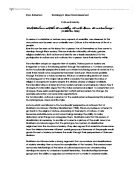Ryan Robertson Sociology C Open Book Assessment
Culture & Identity
“Every human society has its own shape, its own purposes, its own meanings”. (Williams, 1958)
To arrive at a definition of culture many aspects of social life are observed. In this way culture can be seen as an umbrella term. Culture is the whole way of life of a people.
Identity can be seen as the ideas that a person has of themselves as they come to develop through life in society. This can include nationality, ethnicity, gender, religious beliefs etc. Both culture and identity are closely associated. It is the participation in culture and sub-cultures that a person forms their identity within.
Functionalism adopts an organic view of society. Various parts of society are integrated to form a functioning system through the existence of a value consensus. As the functionalist perspective is seen as a whole functioning system in order for it to work there needs to be cooperation between each part. This is made possible through the idea of a value consensus. This is an understanding between each functioning part of the major values within a society. For example the value of religion is accepted in society despite the diverse choice of religion available. Functionalists take an interest into how society remains unwavering but also in how it changes. Functionalists argue that the value consensus is subject to adaptation and changes. There exists social organisation’s which primes society for change. For example education and economic organisations.
For functionalists, culture is a product of the social system whereas identity is shaped by social groups , ideas and life styles.
A study which contributes to the functionalist perspective of culture is that of Durkheim and Mauss : Primitive Classification (1903). This study makes an attempt to go back to the origins of culture. According to their idea’s of culture , it only becomes probable once us as human beings develop the ability to make distinctions amid things and categorize them. Durkheim adds that this system of classification is necessary to enable us to create a picture of the world around us. Durkheim and Mauss argue that the prototype for a system of classification originated from the structure of society. They also argued that social structures come from the divisions between different social groups and because of this people would grade the rest of society or indeed the world through their perspectives of their own divisions.
Durkheim and Mauss make a strong argument that as our ideas and classifications of society develop then so does the complexities of that society. This creates more advanced relationships of the ideas of culture because as our understanding develops we come to understand social hierarchies , the relationships between groups and the ability to organise our environment to make it understandable.
Durkheim’s work makes importance of the idea that culture is of a social derivation. He uses his idea of the collective conscience to explain culture.
“The totality of beliefs and sentiments common to average citizens of the same society forms a determinate system which has its own life: one may call it the collective or common conscience” (Durkheim , 1947)
His argument for the collective conscience is of the idea that it has a strong influence on the people in pre-industrial society. It creates a sense of unity and harmony because each individual feel they are like one another. He argues that as society begins to become more complex and more inquisitive the division of work makes apparent the need for specialisation. This means then that individuals become less like each other but still require each other. For example a medical patient may need a doctor to relieve illness such as a doctor needs patients for research of improving their profession. This leads to the idea that the divisions in work and specialisation lead to excessive individualism. However despite the now specialised culture there can still remain a collective conscience with such institutions like the education system which keep society intact.
Durkheim states that in order for society to run efficiently a shared conscience is needed. This exists despite the way an individual may run their lives or make their decisions and influences their behaviour.







